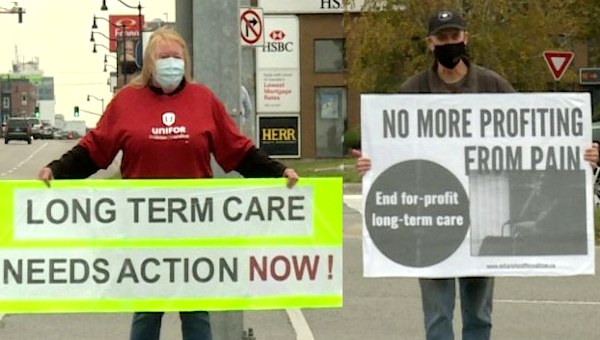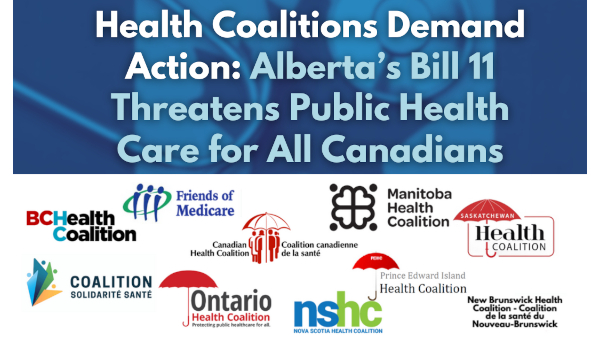Demanding Answers from Ford: Ontario’s Long-Term Care and Hospital Crises
The Ontario Health Coalition issued a statement on January 13 demanding that the Ford government explain what it is going to do about the spiralling crisis in Ontario’s long-term care homes and hospitals, and answer for their lack of preparedness.
“The failures at this point in the pandemic are inexcusable,” said Natalie Mehra, executive director of the Ontario Health Coalition. “75,000 long-term care residents have been locked down almost a month with their fundamental human rights overridden in a way that no one else in society has suffered. Staffing is crumbling entirely in some homes, yet no rapid response teams have been sent in. In other homes, staffing is extremely low, residents are sick with COVID, and on isolation in their rooms 24 hours a day, and there is no possible way for remaining staff to provide adequate care for them. When a significant number of residents are sick with COVID, and others are restricted to their rooms 24/7, they need more care not less.”
Ms. Mehra, speaking for the Coalition, issued an urgent warning. “We are hearing devastating accounts of residents in decline from inadequate feeding, dehydration, lack of basic care. [See below for examples.] At the same time the Ford government is not even requiring basic protections to stem the spread of the virus. In the majority of cases that we hear about, long-term care operators are still not providing staff with N95 masks and requiring their use. PPE is still locked up. It is not an overstatement to call the situation a full-blown humanitarian crisis… Again.”

Profound Crises
In hospitals in Ontario we are also seeing profound unprecedented staffing crises. Ms. Mehra commented: “Here we are in the fifth wave of this pandemic. We are well beyond the point in which the Ford government should have contingency plans ready to go. The Ford government must be required to answer for their inaction and unpreparedness. They are leaving the residents to suffer, decline and yes, horribly, die in long-term care again. We cannot sit by and let this happen.”
There are approximately 75,000 residents in long-term care at this point. On December 14, a new Directive was issued that stated that residents would lose their beds if they went out of their homes for overnight visits. This de facto detention of 75,000 long-term care residents happened while the general public was allowed to gather in groups of 10,000 in sports stadiums. All visitors were barred and essential caregiver restrictions were brought in. Many residents were not only barred from going out to visit family overnight, they were put on isolation, required to stay in their rooms 24/7, eating out of styrofoam containers, and allowed no interaction with other residents. When the virus spread out of control in the general population it made its way into long-term care again. Outbreaks have mushroomed. On December 28, a new Directive was issued forbidding all residents to go out on day trips.
In hospitals the number and size of outbreaks have also surged. On January 5 a whole range of surgeries and diagnostics were stopped across the board under a provincial Directive. That alone is a serious crisis. Since then, we have seen an array of hospitals further close services as a result of critical staffing shortages at the same time as they experience a deluge of patients.
Ms. Mehra added: “The general public needs to understand the gravity of this wave of the pandemic. Omicron is not mild. Hospitalizations are increasing significantly. The health system is overwhelmed and the consequences of unfettered community spread of the virus are disproportionately borne by the elderly and healthcare workers. The conditions in which our province’s 75,000 long-term care residents are suffering are hair raising. They have lost fundamental freedoms, more than 4,000 of them have died of COVID alone and many more have died of neglect, depression, lack of food and water and the results of prolonged isolation. We are terrified about what is going to happen to them as their enforced isolation now reaches a month. The Ford government could do – must do – much more.”
Ontario Health Coalition Briefing Note
The Wave 5 Crisis in Hospitals and Long-Term Care
| Institution Type | Number of Active Outbreaks | Cumulative Number of Outbreaks |
|---|---|---|
| Long-Term Care Homes | 389 | 1,957 |
| Retirement Homes | 268 | 1,193 |
| Hospitals | 204 | 850 |
Since the beginning of the pandemic, there have been 1,957 outbreaks in Ontario’s long-term care homes in which 17,712 residents and 8,235 healthcare workers have been infected with COVID-19. Tragically, 4,077 long-term care residents have lost their lives as a result of COVID-19 alone. Others have died due to inadequate care and feeding. According to Public Health Ontario data:
- The past week from January 4 to January 11, there have been 193 COVID deaths in Ontario with 38 of those deaths in long-term care homes.
- During this past week, there have been 142 new outbreaks declared in long-term care homes, infecting 1,319 residents and 506 healthcare workers (in one week alone).
- There are 389 active outbreaks in Ontario’s 626 long-term care homes.
Hospitals are also in crisis. According to Public Health Ontario data:
- From January 4 to January 11, there have been 114 new outbreaks.
- There are currently 204 active outbreaks in Ontario’s hospitals.
From the Frontlines: Hearing from families and front-line staff in LTC
The stories we are hearing from family members and front-line staff in long-term care confirm the gravity of the situation:
- A family member reports having no PSWs (personal support worker) and 1 nurse on their mother’s unit. (A unit is 28-32 residents.)
- In many homes families and staff are reporting that there are only 2 in the busiest shifts of the day. (Pre-pandemic, and this was already inadequate, we would have heard that there were 4 – or double the number of staff and staffing levels were already in crisis then.)
- Staff are reporting more shift lines left unfilled than they have ever seen.
- Several for-profit chains have issued call outs to family members asking them to apply for paid work or to go in and volunteer to provide care for all residents (not their own families) as an emergency measure.
- Staff are working beyond 12-hour shifts, double-shifts, and more overtime than they can manage.
- Families and staff are reporting low staffing levels resulting in inadequate feeding and hydration, residents left for hours staring at blank walls or ceilings, no baths, and a whole range of basic care that is not happening.
- Families are reporting severe decline and depression among their loved ones on isolation, bed sores, woefully inadequate care and solitude.
- The majority of families and staff we have spoken with in the last week say that staff are not provided with N95 masks and are not required to wear them despite the unfettered spread of the virus in the community and hundreds of outbreaks in the homes.
Hospitals closed & cut services, special measures due to COVID-19 surge:
Hospitals have been required to pause all non-emergency surgeries and diagnostics. In addition, hospitals are reporting serious overcapacity issues and staffing shortages. A number of hospitals have taken additional steps to close services and sites to redeploy staff. For example:
Niagara Health System, Douglas Memorial Site (Fort Erie) The urgent care centre was entirely closed temporarily, as of January 6, to redeploy staff to emergency departments across the hospital’s other sites. Three hundred and fifty-four staff were in self-isolation as of January 7. They also put a pause on their vaccination policy allowing unvaccinated healthcare workers to return to work.
Children’s Hospital of Eastern Ontario (Ottawa) Postponed an array of outpatient appointments for first two weeks in January. Starting January 3, 2022.
Campbellford Memorial Hospital Closed their emergency department was temporarily closed from the evening of December 24 until the morning of December 25 due to staffing shortages.
Queensway Carleton Hospital (Ottawa) Closed services in ambulatory care, therapeutic services, endo/cysto, and other areas, while also limiting the operating room to only emergency and cancer surgeries as of December 29. These are steps the hospital has taken to address a temporary staffing shortage caused by COVID-19, as more than 40 staff tested positive as of December 29 2021.
The Hawkesbury and District General Hospital Closed its ICU in November due to staff shortages. They announced that they were on the cusp of closing their emergency department on January 6 but have managed to stay open.
Peel Memorial Centre (Brampton) The urgent care centre was closed until at least the end of day Monday, January 10 in order to redeploy staff and physicians. In a subsequent announcement, they are now expected to remain closed until February 1.
Stratford General Hospital The inpatient surgery unit was closed to admissions due to a COVID-19 outbreak as of January 8, 2022.
Cambridge Memorial Hospital Admission to the in-patient surgery unit (Wing B, level 3) was temporarily closed after a COVID-19 outbreak was declared.
Chatham-Kent Health Alliance As of January 4, 2022, the hospital reported its intensive care unit is at 100% occupancy. Due to the lack of capacity in the ICU, two patients had been transferred to London.
London Health Sciences As of January 8 2022, 438 hospital staff had tested positive for COVID, up sharply from the 350 reported a day earlier. The hospital reported 54 staff cases on Dec. 23.
Bluewater Health (Sarnia) On January 5 the hospital CEO sent a letter to the community stating that the ICU is at 100% occupancy. Two-thirds of those patients have severe COVID disease. Most are on ventilators. Rising admissions have led to more end-of-life discussions in a reopened dedicated COVID-19 unit. Staff absences are now five times higher than typical. The rapid spread of the Omicron variant is forcing the remaining staff to work double shifts with vacation cancelled.
Grand River Hospital (Kitchener) As of January 7, two hundred of its 4,300 staff members were off on isolation. They have limited surgeries to accommodate only urgent, emergent and cancer cases until January 15 and are reviewing staffing across the hospital continually, to be able to redeploy staff and other resources to support the provision of urgent and inpatient care.
The Ottawa Hospital On January 7 the hospital announced patients may receive care in “unconventional spaces” as it prepared for the next phase of its surge plans, including potential use of the gymnasium in the rehab area. The hospital is also postponing non-urgent surgeries, procedures and ambulatory care activity. •
This article first published on the Ontario Health Coalition website.





